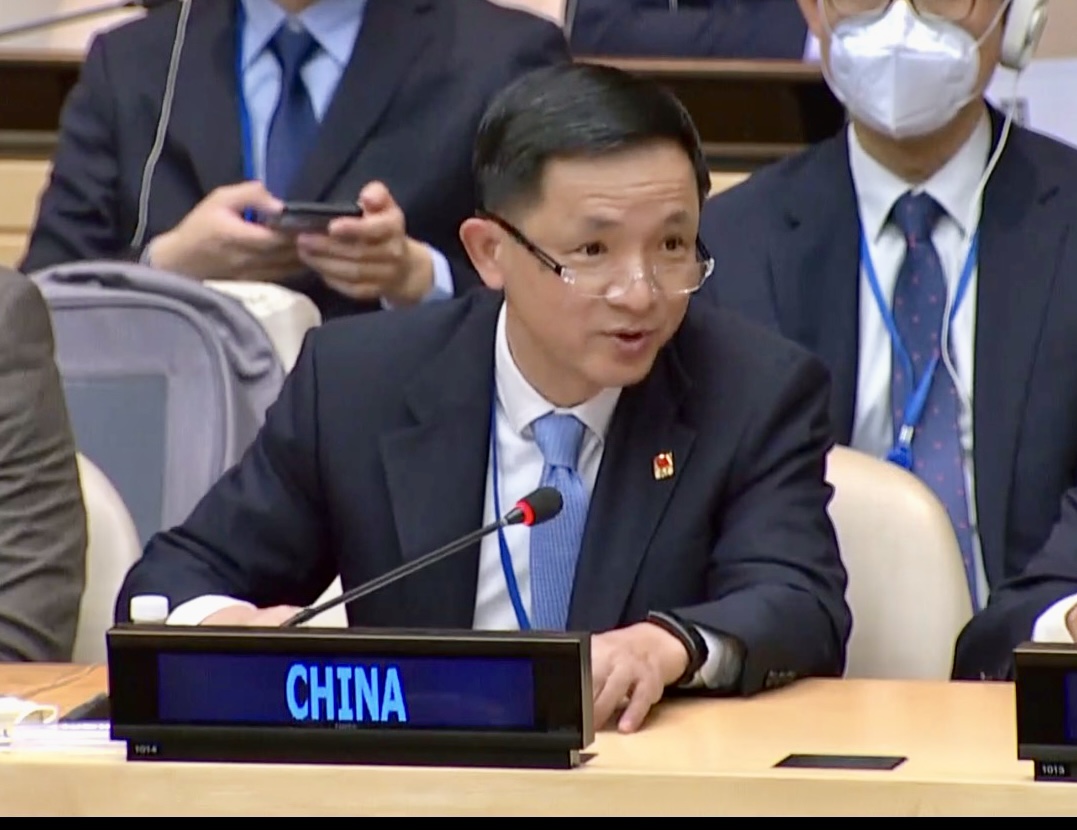| Remarks by Ambassador Dai Bing at the Side Event of the Group of Friends in Defense of the Charter of the United Nations on the Negative Impact of Unilateral Coercive Measures on Human Rights |
| 2022-10-12 16:45 |
|
Your Excellency, China thanks Venezuela for hosting, on behalf of the Group of Friends in Defense of the UN Charter, this side event on the negative impact of UCMs on human rights. I thank all the distinguished panelists for their thought-provoking remarks. At present, our world has entered a new phase of turbulence and change. We are faced with the prolonged COVID-19 pandemic, worrying international security situation, recession risks of the world economy, and multi-facet global challenges. Against this background, it is highly relevant for us to hold this side event. It will help the international community pay closer attention to the UCMs’ negative impact on national development and human rights, and strengthen solidarity and cooperation for international fairness and justice. Your Excellency, UCMs are a tumor of human society. They are illegal, and they are unreasonable. First, UCMs violate the UN Charter and international law. UCMs initiated by individual countries based on their domestic laws and those countries’ abuse of long-arm jurisdiction seriously violate the purposes and principles of the UN Charter, the fundamental principle of sovereign equality in international law, and the basic norm of non-interference in international relations. Some countries even attempt to use UCMs to suppress the legitimate governments of the countries concerned, and instigate “color revolutions” for regime changes, which poses a serious threat to world peace and stability. Second, UCMs gravely undermine the basic human rights of the people in the affected countries. The UCMs by the US and some other western countries under the pretext of human rights are in fact a violation of the human rights in other countries. As noted by Special Rapporteur Ms. Douhan, the abuse of UCMs by western countries has seriously infringed upon the rights to subsistence, health, development, education, etc. for people in the affected countries. Those UCMs have led to the increasing mortality rate for women and newborns in the countries concerned, and caused greater difficulties for people with disabilities to have access to rehabilitation equipment, and for students to use video conferencing service for distance learning. Those western countries must be held responsible and accountable for the systematic violation of human rights caused by their UCMs. Third, UCMs exacerbate global crises. The abuse of sanction measures by some individual countries, like imposing trade bans, blocking financial investments, and interfering with markets, is disrupting international economic, trade, and technological cooperation, gravely threatening the global food, energy, and financial security, and exacerbating the livelihood difficulties for developing countries, even resulting in humanitarian disasters in some vulnerable countries. UCMs also cause severe damage to the harmony and stability of international relations. Even normal activities such as paying UN dues and attending UN meetings in the New York City have been interfered with by UCMs. Such practices should be condemned. The international community has all along voiced its consistent opposition to UCMs. Since 1989, the General Assembly has been adopting every two years resolutions on unilateral economic measures as a means of political and economic coercion against developing countries; since 1992, UNGA has been adopting every year resolutions urging the United States to end its economic, commercial and financial embargo against Cuba; and since 1997, UNGA has been adopting every year resolutions that focus on human rights and UCMs. We urge the US and some other western countries to face squarely the international appeal for justice, and immediately cancel their UCMs, so as to practice true multilateralism with concrete actions. We call on Member States, the UN system, and other international organizations to provide sufficient support to sanctioned countries to alleviate their practical difficulties. Your Excellency, China is always a champion for and contributor to global development. We are also a trust-worthy partner for fellow developing countries. China launched the China-UN Peace and Development Fund and the Global Development and South-South Cooperation Fund. We have provided development assistance to more than 160 countries in need, and provided the largest amount of debt relief for developing countries among G20 members. In 2021, at the 76th session of the General Assembly, President Xi Jinping proposed the Global Development Initiative. In June this year, President Xi hosted the High-level Dialogue on Global Development, and announced 32 cooperation measures for the 8 key areas of the GDI. On the sidelines of this year’s UNGA general debate, China successfully held the ministerial meeting of the Group of Friends of the GDI, where we announced the first GDI project pool, and proposed seven practical measures in fields such as food security and clean energy. All of these have made positive contribution to developing countries’ response to the multi-facet crises. Your Excellency, China always stands on the side of multilateralism, and on the side of fairness and justice. We once again urge relevant countries to immediately put an end to their UCMs. And we call on the international community to pay high attention to UCMs’ negative impacts, reject such illegal behaviors, and work together for a better world where everyone can equally enjoy human rights. |
| |||||||||||||
| |||||||||||||
